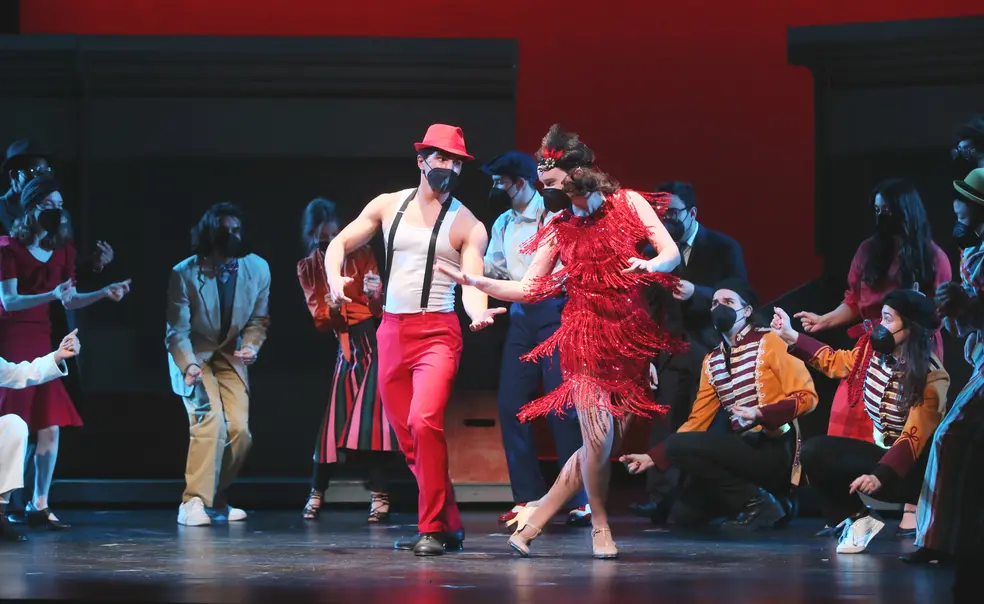In Short: Triangle Club Presents ‘Singin’ In the Train’
The Princeton Triangle Club, pictured here in a dress rehearsal, stayed on the rails during its return to McCarter Theatre Jan. 28–30. The premiere of Singin’ In the Train, a Dinky-themed musical, was pushed back because of COVID concerns, and the show was open only to students, faculty, and staff. Triangle plans to reprise the show for Reunions audiences in May.
President Eisgruber ’83’s annual state of the University letter, sent in February, reaffirmed Princeton’s commitment to in-person teaching and learning during the pandemic and outlined near- and long-term initiatives, including the expansion of the undergraduate student body; development of the new Lake Campus; construction of new facilities for engineering, environmental sciences, and the University Art Museum; and efforts to improve diversity, equity, and inclusion. Eisgruber also wrote about his goals for the Venture Forward campaign, which launched in October. To read more, visit bit.ly/eisgruber-2022.
In a Feb. 16 open letter, Divest Princeton urged the New Jersey attorney general to investigate the University’s continuing investment in the fossil-fuel industry as a potential violation of the state’s Uniform Prudent Management of Institutional Funds Act. The group of students and alumni made its complaint in concert with fossil-fuel divestment advocates at Yale, MIT, Stanford, and Vanderbilt, who sent similar requests to their home-state attorneys general. Divest Princeton representative Hannah Reynolds ’22 explained the strategy in an editorial for The Daily Princetonian, writing that the group has been frustrated by “bureaucratic obstacles.”
University spokesman Michael Hotchkiss referred PAW to previous statements on Princeton’s dissociation process. In May 2021, the University announced that the Board of Trustees approved dissociation from certain fossil-fuel companies,including those “participating in campaigns that spread disinformation about climate change” and “companies in the thermal coal and tar sands segments of the fossil fuel industry.” A September 2021 update said that a faculty panel would produce a report on the dissociation process by the end of the 2021–22 academic year.
Two Princeton faculty members and a graduate alumnus were selected as 2022 Wolf Prize laureates. Molecular biology professor Bonnie Bassler will share the Wolf Prize in Chemistry. Her prize citation recognized Bassler and fellow honorees Carolyn Bertozzi (Stanford and the Howard Hughes Medical Institute) and Benjamin F. Cravatt III (Scripps Research Institute) “for their seminal contributions to understanding the chemistry of cellular communication and inventing chemical methodologies to study the role of carbohydrates, lipids, and proteins in such biological processes.” Architecture professor Elizabeth Diller, a founding partner of the firm Diller Scofidio + Renfro, is one of three Wolf Prize in Architecture honorees. The prize announcement highlighted her “exceptional and influential work connecting architecture to artistic practice, engaged in the public domain.” George Lusztig *71, a professor at MIT, will receive the Wolf Prize in Mathematics “for groundbreaking contributions to representation theory and related areas.”
The prizes for scientists and artists are presented by the Israel-based Wolf Foundation and include a $100,000 award. The date for this year’s presentation at the Knesset (Israel’s parliament) in Jerusalem has not yet been announced.
Shaffin Siddiqui ’22 is among 23 U.S. recipients of the 2022 Gates Cambridge Scholarship. The scholarship, founded in 2000 by the Gates Foundation, supports postgraduate study at the University of Cambridge. Siddiqui is a history concentrator and plans to pursue a master’s degree in the history and philosophy of science and medicine.
Former University president Shirley M. Tilghman will receive the Genetics Society of America’s George W. Beadle Award for “outstanding contributions to the community of genetics researchers.” Tilghman, who is teaching an undergraduate course on modern genetics and public policy this spring, was recognized for her contributions in research, her advocacy for funding and data-sharing, and her service on the National Advisory Council for the Human Genome Project Initiative.
As the number of COVID-19 cases on campus began to decline in early February, the University lifted several restrictions on gatherings put in place late in the fall semester. A 20-person limit on undergraduate gatherings in dormitories and off-campus residences was removed, allowing eating clubs to resume regular dining, and Princeton athletics reopened indoor events to vaccinated spectators.












No responses yet